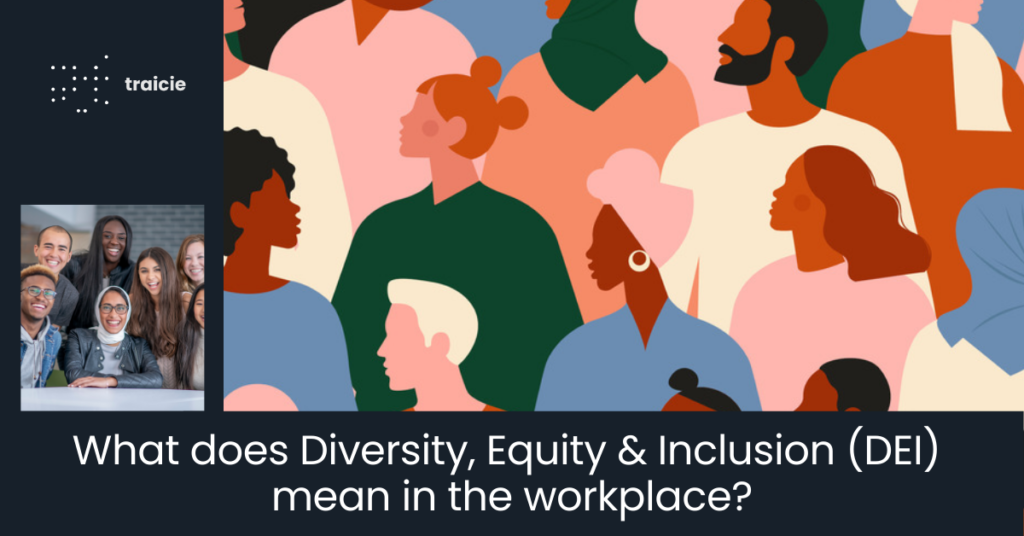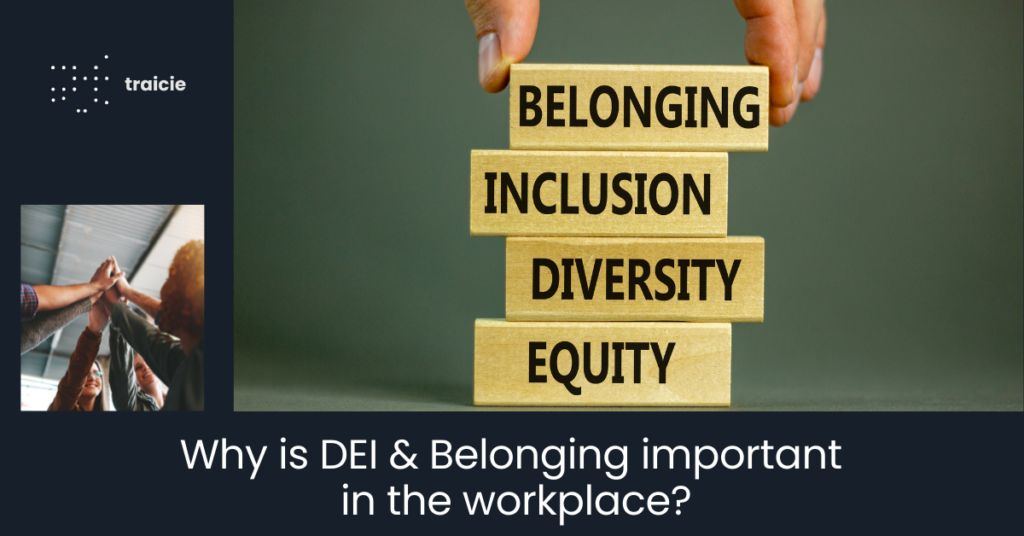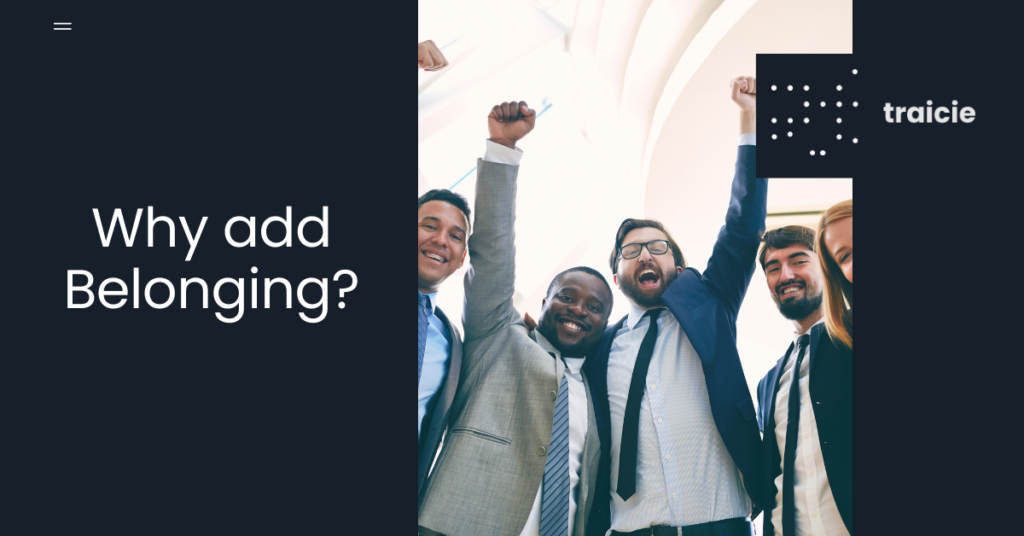Companies are under an increasing pressure to create diverse and equitable workplaces. But what does that mean? In this article, we’ll introduce the concepts of diversity, equity, inclusion (DEI) and belonging (B) and explain why they’re essential in the workplace.
What does Diversity, Equity & Inclusion (DEI) mean in the workplace?

DEI, or diversity, equity, and inclusion, is a term you may have heard in the workplace. But what does it mean? DEI is about creating a workplace where everyone feels welcome, respected, and valued. It’s about creating an environment where everyone can succeed, regardless of background or identity.
There are many benefits in creating a DEI-friendly workplace. For example, it can help attract and retain top talent. A diverse workforce brings different perspectives and ideas, leading to innovation and better business results. Additionally, DEI can help build a stronger sense of community within a company and foster a more positive work environment.
If you’re unsure where to start with DEI in your workplace, there are many resources available in today’s market. The first step is to educate yourself on the topic and become aware of the issues. Then, you can start implementing policies and practices that will help create a more inclusive environment for everyone.
|>>> Do you know: Top DEIB Leaders of 2022: Advocate for Women
Why is DEI & Belonging important in the workplace?

Diversity, equity, inclusion (DEI) and belonging are essential for several reasons. First, a diverse team, where everyone is valued, creates a more positive and productive work environment. Additionally, a diverse workforce better reflects the communities we serve. And finally, studies show that organisations that have DEI&B in their mind when creating teams make better decisions.
Despite the apparent benefits, many organisations struggle with creating an inclusive culture. A couple of tips to start making progress?
1. Define diversity, equity, inclusion (DEI) and belonging for your organisation.
2. Assess where you are today. This includes understanding your current employee demographics and conducting climate surveys to gauge employee satisfaction.
3. Set goals and develop action plans to reach them. Be sure to involve employees in this process so they feel ownership over any changes.
4. Hold everyone accountable for making progress on diversity, equity, inclusion (DEI) and belonging initiatives. This includes managers, who play a critical role in setting the tone for their teams.
|>>> Do you know: Top DEIB Leaders of 2022: Advocate for DEI&Belonging
What Is Belonging?
Belonging is an integral part of the culture of a company. Employees feel like they belong at work when everyone fully accepts them and includes them.
The network for professional services, Deloitte, says that; an employee’s sense of belonging comes from working for an organisation that helps them feel like they are part of a diverse, fair, and inclusive community. This affects how employees feel accepted, able to be themselves, and able to help their organisations reach their goals.
Also, Deloitte says that; to create a sense of belonging, you need the following qualities that build on each other:
- Comfort: Employees should feel comfortable at work, which means they must be treated fairly and respected by their co-workers and leaders.
- Connection: Employees should feel like they have meaningful relationships with their coworkers and teams, which keeps them connected to the organisation’s goals.
- Contribution: Employees should feel like they are making a difference and know how their strengths help the company reach its goals.
Many workplace factors, such as company culture, benefits, communication methods, learning and development resources, and mental health support, can affect an employee’s sense of belonging. Any day-to-day interactions between coworkers and managers or company-wide projects can affect the workplace culture and how employees feel about their jobs.
_____________________________________________________
traicie’s psychological and free cultural fit test wouldn’t have been possible without our participating business partners and academical experts from Universities. The organizations that collaborated with us to research all the top performers in each industry discovered that they all shared 29 common working styles.
Finally, these 29 factors set them apart from the competition and contribute to their organizational success.
Why add Belonging?

Belonging is an essential part of developing, and it’s something that all cultures have. Belonging to a group has been shown to improve mental health, makes people happier and more satisfied with their lives, helps them connect with others, and even protects them from stress. So why does it matter so much?
There are several important ones. First, belonging makes us feel like we have a connection with other people. We are happier and more satisfied when we feel connected to other people. Belonging also helps people get along with each other. When we talk to and spend time with other people, we learn and gain experiences that help us know more about ourselves and the world around us. Lastly, being a part of a group protects us from stress. When we feel part of our communities and cultures, we’re less likely to feel stressed out by things in life.
How does this affect businesses? There are a few main points to remember. First, companies can make their customers feel like they belong to the company by providing exciting content and services. Businesses can also help employees get to know each other by encouraging them to participate in company events and projects. And finally, businesses can support their workers and avoid stress by making the workplace a place where people help each other.
|>>> Do you know: Top DEIB Leaders of 2022: Advocate LGBTQ+ NexGen
Some statistics
In a report by Deloitte, “belonging” appeared to be the most important human capital issue companies face today. Nearly three-quarters (73%) of respondents said that creating a sense of belonging is essential to a company’s success, and 96% agreed that a sense of belonging drives organisational performance.
In a culture of belonging, employees are encouraged to be themselves and reach their full potential at work. Belonging is suitable for both employees and the organisation as a whole. In particular, making people feel like they belong at work can offer the following benefits:
- Improved employee performance
- Increased employee engagement
- Reduced employee absenteeism
- Reduced employee turnover
- Improved workforce experiences
- Strengthened workplace culture
- Raised employer branding
|>>> Read more: Diversity, Equity & Inclusion Statistics (DEI Stats)
Conclusion
DEI & Belonging affects an employee’s health, happiness, engagement, motivation and retention. That’s why organisations often emphasise making people feel like they belong when they make efforts to promote diversity, equity and inclusion. Aside from these programs, a focus on “belonging” can significantly improve workplace culture.
Do you know that traicie’s sourcing tools for recruiters can help the hiring team with culture-based hiring but also improves the strategic, operational value of the recruiting process :
- Cost of a job board – Reduce annual spending on job boards
- Cost of HR tools – Reduce the cost of surveys and assessment tools
- Recruitment costs – Reduce selection costs
- Internal mobility – Fill more skilled jobs with internal staff
- Time to hire – Reduce the number of days a role goes unfilled
- Salary costs – Reduce overall salary costs
- Attrition – Reduce the rate of turnover
- Recruitment cost – Reduce the general recruitment cost